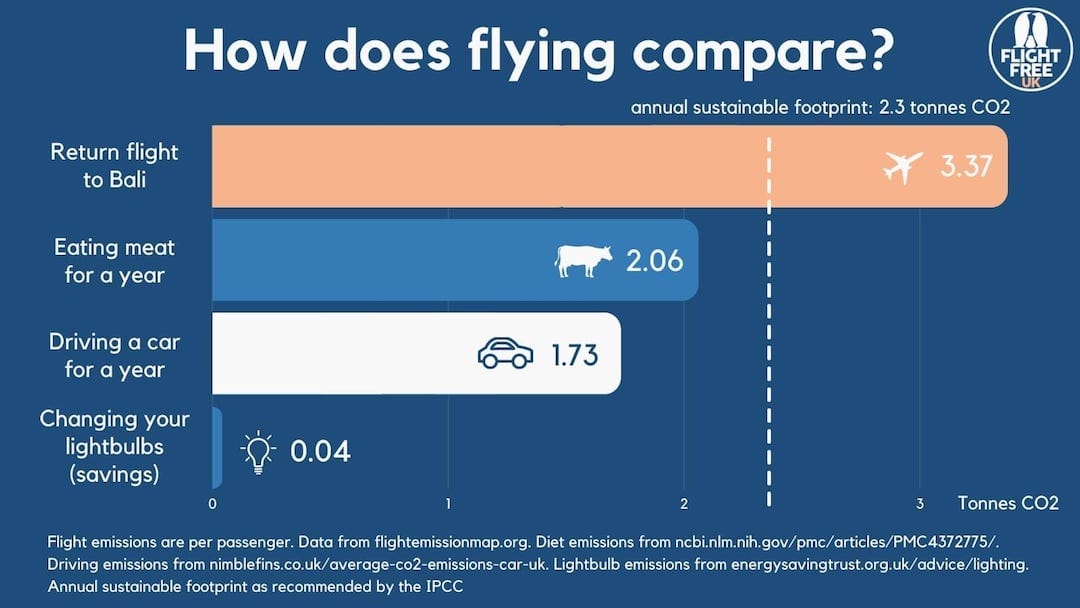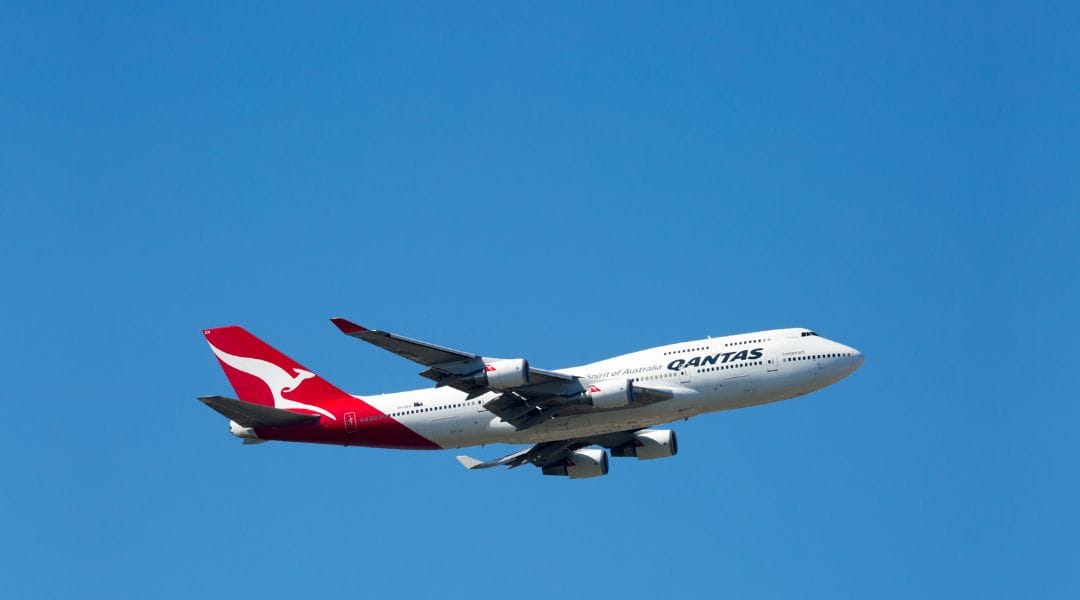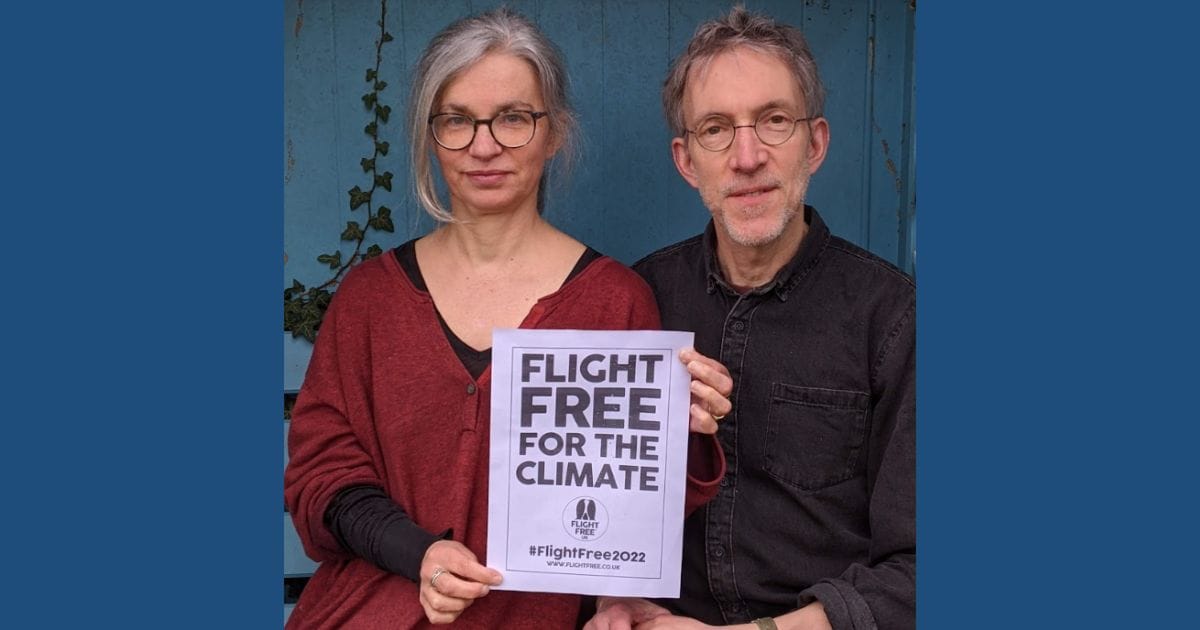Many headlines say that ‘giving up meat and dairy is the biggest single thing you can do for the planet.’
Reducing your intake of animal products is a terrific way to lower your emissions, but how does it compare to giving up flying?
It's important to say that all actions to reduce emissions are valid and impactful, including in how we eat and travel. The aim here is not to discourage people from taking a particular action, or to say that one is ‘better’ than the other, but to crunch some numbers and see why we draw the conclusions that we do.
Let’s have a look at the statistics:
According to a report published in 2013, animal agriculture is responsible for 14.5% of global emissions.
And according to 2018 figures, aviation is responsible for 3.5% of global emissions.
So on face value it’s understandable why people think that changing our diet would have more impact on emissions than changing our travel habits.
Global vs individual
However, these stats talk about global figures. Globally, the animal agriculture sector has a bigger share of emissions than the aviation sector, but that’s mainly because animal agriculture serves a much, much larger proportion of the global population. It has been estimated that only around 10% of people across the globe fly in any given year, whereas meat protein is found in 40% of diets. No wonder that the overall impact of aviation is lower. Far fewer people do it.
When we look at the individual picture, the numbers are much more stark. While reducing or cutting your meat intake can do wonders for lowering your carbon footprint, with estimates suggesting that you can save nearly a tonne of CO2 per year by going vegan, taking a flight anywhere outside Europe can immediately heap it back on.
The savings made through adopting a vegan diet are quickly extinguished.
Per passenger, a trip (return) to the east coast of the USA will generate between 1.3 and 1.9 tonnes CO2. For the west coast, it would be above two tonnes.
Heading the other way, a holiday in the popular tourist destination of Bangkok will add 2.5 tonnes to your emissions, and if you’re going as far as New Zealand, well, it’s closer to five tonnes. The savings made through adopting a vegan diet are quickly extinguished – and then some.

This doesn’t mean that people shouldn’t bother reducing their meat consumption. It's a very powerful step to take for the planet and the animals, and your own health. We considered very carefully whether to compare diet to aviation at all, because comparisons can be misinterpreted or be unhelpful. Anyone can make a comparison go their way or be used to illustrate their own agenda.
One flight can generate more emissions than a year’s worth of meat consumption or driving a car.
But it’s useful to hold up the impact of aviation in relation to other lifestyle choices, to put things into context. Eating meat and driving a car are generally known to be fairly high in emissions, but the average reader might be surprised to know that just one flight can generate more emissions than a year’s worth of doing one or other of those activities.
CO2 or GHG?
A note here: even though we are saying ‘CO2’, the figure includes non-CO2 impacts. Greenhouse gas emissions from animal agriculture include carbon dioxide, methane and nitrous oxide. Technically, this is known as CO2e (carbon dioxide equivalent) – we could also use the acronym GHGs (greenhouse gases).
The reason that most sources still refer to carbon dioxide is mostly for simplicity. Research shows that people understand the concept of carbon emissions and a carbon ‘footprint’, whereas talk of other greenhouse gases becomes complicated and encourages confusion and doubt. As a result, the term ‘carbon’ is widely used as a catch-all term for all greenhouse gas emissions.
Other impacts
The 2.06 tonne figure for eating meat takes into account the full field-to-fork impact. It includes greenhouse gases from production, transportation, storage, cooking and wastage. The global figure of 14.5% for animal agriculture also includes these aspects of the industry.
The figure for aviation also takes into account non-CO2 impacts, such as nitrous oxide and water vapour from contrails.
Driving emissions are tailpipe emissions only, and don’t take into account the manufacturing of the vehicle. This is because that’s a one-off carbon cost, and doesn’t go up or down the more you drive – whereas with meat consumption, the entire field-to-fork process is repeated with each meal. Similarly, aviation figures don’t take into account the carbon costs of infrastructure or manufacture (imagine how high the figures would be if they did!).
Of course, there are lots of reasons why people might choose to be vegan, other than because of the greenhouse gas emissions. In many cases, farming has a negative impact on biodiversity, and water use and pollutants from run-off are also an issue. Animal welfare is, naturally, the big one, and health plays its part.
Only half of all Brits fly in any given year, yet we all pay the price of rising emissions.
Similarly, there are lots of reasons to give up flying beyond the emissions: airport noise and pollution make life difficult for people and wildlife, and there are plenty of justice issues surrounding aviation, not least that only half of all Brits fly in any given year, yet we all pay the price of rising emissions (and through our taxes to subsidise the industry).
On a personal level, travelling overland can be much less stressful, more enjoyable and more relaxing than flying, so being flight free can be as good for ourselves as for the planet.
So, is it better to be vegan or flight free?
In conclusion: definitely take steps to reduce your meat consumption, for all of the reasons outlined above. Please also try to reduce the amount you fly, perhaps by taking our Flight Free Challenge.
The founder and director of Flight Free UK is vegan and flight free, and she would urge you to give both a try – as well as leaving your car at home, installing solar energy on your house, and composting your waste rather than sending it to landfill.
Take steps to reduce your meat consumption, and also try to reduce the amount you fly.
There’s no doubt that in order to avoid catastrophic climate change, we must change everything about the way we live: what we eat, how we heat our homes, what we wear and how we travel. For some of us, one thing might be easier than another, and we each need to work out where our greatest impact lies.
But if you see a headline that states ‘the single biggest thing you can do for the planet is xxx,’ be a little wary. The answer is going to be a bit more complicated than that.
Calculations for chart (all sources accessed Feb 2021):
- Flight emissions from flightemissionmap.org
- Average meat consumption in the UK = 85g per day, 85g meat per day generates 5.63kg CO2, x 365 = 2.06 tonnes per year
- Driving emissions from nimblefins.co.uk/average-co2-emissions-car-uk
- Lightbulb emissions from energysavingtrust.org.uk/advice/lighting




